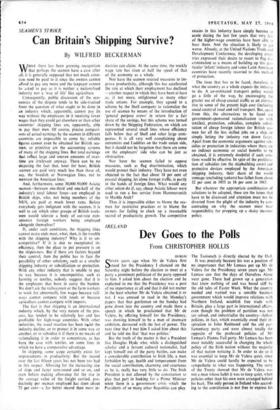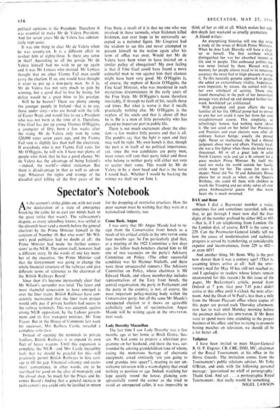IRELAND Dev Goes to the Polls
From CHRISTOPHER HOLLIS
DUBLIN
SSEVEN years ago when Mr de Valera first stood for the Presidency I chanced on the Saturday night before the election to meet at a party a prominent politician of the party opposed to him. I asked him about the election and he explained to me that the Presidency was a post of no importance at all and that it did not matter in the least whether Mr de Valera obtained it or not. I was amused to read in the Monday's papers that that gentleman on the Sunday had gone down. into the country and .made there a speech . in which he proclaimed that Mr de Valera, by offering himself for the Presidency, was showing himself to be a man of insensate ambition, devoured with the lust of power. The next time that I met him I asked him about this and he told me that 'that was politics.'
But the truth of the matter is that a President like Douglas Hyde who, while a distinguished scholar and a fervent cultural nationalist, had kept himself out of the party battles, can make a considerable contribution to Irish life, a man forbidden by age, health and temperament from the social contribution, charming and courteous as he is, really has very little to do. The Irish President is not allowed by the constitution to play that part in looking for a Prime Minister when there is a government crisis which the Presidents of so many other Republics can play.
The Taoiseach is directly elected by the Dail.
It was precisely because his was a position of no importance that Mr Lemass put up Mr de Valera for the Presidency seven years ago. Mr Lemass saw that the days of Ourselves Alone were gone. There had grown up a generation that knew nothing of and was bored stiff by the old tales of Easter Week. What the country needed and wanted was a sensible business government which would improve relations with Northern Ireland, establish free trade with Britain, play a large part in international affairs, even though the problem of partition- was not yet solved, and industrialise the country—follow policies, in fact, which essentially owed their in- spiration to John Redmond and the old par- liamentary party and were almost totally the opposite of the professed policies of Mr Lemass's Fianna Fail party. Mr Lemass has been most notably successful in changing the whole policy of the Irish nation without the majority of that nation noticing it. In order to do so it was essential to keep Mr de Valera quiet; since Mr de Valera could hardly be expected to be sympathetic to what was happening. The story of the Treaty showed that Mr de Valera was not a man Whose habit it was to keep quiet, when policies other than his own were arranged behind his back. The only person in Ireland who accord- ing to the constitution is not free to express his
political opinions is the President. Therefore it was essential to make Mr de Valera President. And for seven years Mr de Valera has substan- tially kept quiet.
It was one thing to elect Mr de Valera when he was seventy-six. It is a different affair to re-elect him at eighty-three. Is there any sense in that? According to all the gossip, Mr de Valera himself had no wish to go up again and it was Mr Lemass who insisted. Mr Lemass thought that no other Fianna Fail man could carry the election. If so, one would have thought it wiser to put up a non-party man. As it is, Mr de Valera has not very much to gain by winning, but a good deal to lose by losing, for defeat would be a great blow to his prestige.
Will he be beaten? There are plenty among the younger people in Ireland—that is to say, those under sixty—who are bored with the talk of Easter Week and would like to see a President who was not born at the time of it. Therefore, Fine Gad has put up young Thomas O'Higgins, a youngster of fifty, born a few weeks after the rising. Mr de Valera only won by some 120,000 votes seven years ago, and the Fianna Fail vote is slightly less than half the electorate. If everybody who is not Fianna Fail votes for Mr O'Higgins, he will win. I have met plenty of people who think that he has a good chance. Mr de Valera has the advantage of being Ireland's —indeed, the world's—oldest statesman. But there is disadvantage in that as well as advan- tage. Whatever the rights and wrongs of the dreadful civil killing of the first years of the Free State, a result of it is that no one who was involved in those turmoils, when Irishmen killed Irishmen, can ever hope to be universally ac- cepted as a national figure. Mr Cosgrave had the wisdom to see this and never attempted to present himself to the nation again after his term of office was over. Would not Mr de Valera have been wiser to have insisted on a similar policy of abnegation? My own feeling is that if Fine Gad could have found a more colourful man to run against him their chances might have been very good. Mr O'Higgins is, of course, the nephew of Kevin O'Higgins, the Fine Gael Minister, who was murdered in such mysterious circumstances in the early years of the Free State. Mr O'Higgins's name therefore inevitably, if through no fault of his, recalls those sad times. But what is worse is that it recalls practically nothing else. Mr O'Higgins is the nephew of his uncle and that is about all that he is. He is a man of little personality who has played no important part in public life.
There is not much excitement about the elec- tion—a few modest little posters and that is all. The pundits say that the fight is open and they may well be right. My own hunch is that, though the post is in itself of no political importance, yet, since the two candidates are party men, most voters will vote their party ticket and those who belong to neither party will either not vote or scatter their votes. This would let Mr de Valera in by a short head and that is the horse I would back. Whether I would be backing the w inner we shall see on June 1.



































 Previous page
Previous page